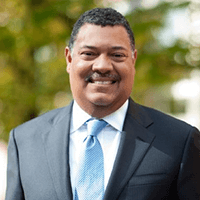
As we emerge from the pandemic and begin to address the social, economic, and political turmoil left in its wake, I offer the theme Freedom, Equality, and the Common Good as an opportunity to consider how our legal system will engage the realities of a post-pandemic world.
This experience has shown us that crafting a common understanding of what freedom means in a democratic society can be very complicated, particularly in the face of a crisis. Some see the executive powers used to enact sweeping public health restrictions and actions by employers to mandate vaccines during the pandemic as threats to our freedoms. Yet, a rejection of those restrictions and employer mandates has had some devastating results: the emergence of new virus variants and a new surge of infections, hospitalizations, and deaths that fall disproportionately on the elderly, those of low and moderate income, and on communities of color.
When we think about our right to be free from unreasonable government restraints, what role should countervailing responsibilities to our fellow citizens play in striking the balance? How can a democracy survive without empathy, mutual respect, and compassion?
Which brings us to equality. One of the bedrocks of equality in a modern democracy is universal suffrage. Our recent presidential election saw some of the most brazen attempts at voter suppression since the Jim Crow era and an explosion of new legislation around the country designed to make it more difficult to vote. The broad availability of the franchise is still a contested notion in this country, and it is inextricably linked to our history of slavery and white supremacy. A once-in-a-century pandemic could not suppress the symptoms of America’s chronic racism, which persist in a society where other forms of inequality have also hardened and remain unaddressed.
Life has gotten demonstrably worse for most Americans over the past 40 years, so we should not be surprised to see a surge in the appeal of authoritarianism, nationalism, and xenophobia, as well as increasingly frequent outbursts of mayhem and violence. Rampant inequality is an enemy of democracy. As Isabel Wilkerson has suggested, the quest for racial justice and equality in this society has been disfigured by the endurance of a status-based economic and social order that cannot be undone by an emphasis on individual rights and freedoms. If we care about the future of our republic, what do we plan to do about it?
One possible approach might be to turn our attention to the concept of the common good. The two great founding democracies of the modern era, the United States and France, sprang from what were in the 18th century radical ideals that broke explicitly with the old order of aristocratic hierarchy and inherited privilege. But the French republican tradition retains one constitutional principle that the United States does not share: fraternity. In recognition of the importance of this principle, French olive farmer Cedric Herrou was protected from prosecution in 2018 after being charged with smuggling undocumented migrants across the French/Italian border. The French Constitutional Court ruled that Herrou had acted within his rights, noting that “the principle of fraternity confers the freedom to help others, for humanitarian purposes, regardless of the legality of their presence on national territory.”
Both freedom and equality are inextricable from a meaningful engagement with the common good. We cannot construct a political and legal system that fails to understand us both as individuals and as citizens who are embedded in, and ennobled by, our relationships and communities. This year, let us consider how we might reimagine the intersection of freedom, equality, and the common good to strengthen democracy and rule of law in the years to come.